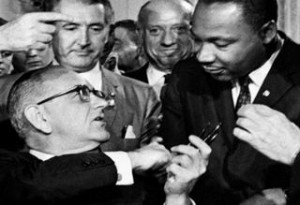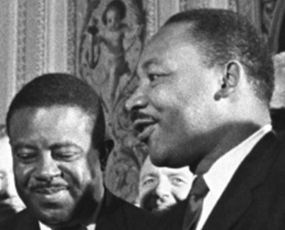
A Paramount Pictures photo of “Selma,” from left to right: Tessa Thompson plays Diane Nash, Omar Dorsey plays James Orange, Colman Domingo plays Ralph Abernathy, David Oyelowo plays Martin Luther King, Jr., Andre Holland plays Andrew Young, Corey Reynolds plays Rev. C.T. Vivian, and Lorraine Toussaint plays Amelia Boynton.
At this time when voting and other civil rights are under attack in America especially by the state and federal governments I was looking forward to the movie Selma. I was so sure it would tell the people who were not yet born 50 years ago a real view into the events of that era.
Dr. John Elliott Churchville wrote in his essay “The Quiescent/Self-Liberative Contradiction’s Encounter with African Mis-Education” “African educators (learners-teachers-students) of our children must be radical—i.e., they must be revolutionaries committed to the liberation of our children from ideas and worldviews that demean them and us as a people, and must be able and willing to confront the lies and contradictions found in learning materials and make them part of the dialogue with students. Dialoguing with students-teachers-learners is the critical component in the learning process.”
Selma is a 2014 American historical epic drama film directed by Ava DuVernay and written by Paul Webb. It is based on the 1965 Selma to Montgomery voting rights marches led by James Bevel, Hosea Williams, and Martin Luther King, Jr. of SCLC and John Lewis of SNCC.
I say 2014 American historical epic drama because in some very important details it differs from the 1965 real life epic drama. Selma has received wide acclaim from film critics. Inasmuch as the movie is beautifully shot and the characters a magnificently portrayed, Jason Moran, composer of the music for the film, is memorable.

For the majority of Americans who will see this film it is the only window they will have to the events that unfolded during the strife and struggle of the fight for the 1965 Voting Rights Act. Inasmuch as most people really DO believe what they see on the big screen, especially when Oprah is one of the producers, the producers had an obligation to get it right. And they missed it.
If you don’t know the history of the three Selma marches in March of 1965 – well, I wish the movie had gotten it right.
February 18, 1965 – During a march in Marion, Alabama state troopers attack the demonstrators. State trooper James Bonard Fowler shoots and kills Jimmie Lee Jackson. Jackson was unarmed. Fowler was charged with murder in 2007 and pleaded guilty to manslaughter in 2010. Jimmie Lee Jackson’s murder is portrayed at a different time and place later in the movie. Jimmie Lee Jackson was a deacon of the St. James Baptist Church in Marion, Ala., ordained in the summer of 1964. Jackson had tried to register to vote without success for four years. Jackson was inspired by SNCC who had touched off a campaign against Alabama restrictions on Negro voting and attended meetings several nights per week at Zion’s Chapel Methodist Church. This desire to vote led to his death at the hands of an Alabama State Trooper and to the inspiration for the Selma to Montgomery marches.

The 1965 Selma Movement could never have happened if SNCC (Student Nonviolent Coordinating Committee) hadn’t been there opening up Selma in 1962 and 1963. The later nationally known movement was the product of more than two years of very careful, very slow work.
Much has been written about the miss-representation of role of President Johnson in the film. And since I have come to think of President and Lady Bird Johnson as personal friends, I have to agree with much of what has been written.
LBJ Library Director Mark Updegrove alleged the film portrayed President Johnson as an obstructionist and said, “When racial tension is so high, it does no good to suggest that the president of the U.S. himself stood in the way of progress a half-century ago. It flies in the face of history.”

I am sure that the falling out between King and Johnson occurred not as depicted in the film but in 1967. This occurred after King took a stand against the administration for shortchanging the War on Poverty while spending billions of dollars on the Vietnam War. But that break occurred when King made his blistering speech against the war in New York City April 4, 1967. King delivered the speech, sponsored by the group “Clergy and Laymen Concerned About Vietnam,” after committing to participate in New York’s April 15, 1967, anti-Vietnam war march from Central Park to the United Nations sponsored by the Spring Mobilization to End the War in Vietnam. One year to the day they killed him.Former Martin Luther King Jr. aide Andrew Young said, “President Johnson did not say ‘it had to wait.’ He said, ‘I have a great agenda.’ …We did not expect him to commit. We were really kind of letting him know that we had to pursue voting rights. His agenda, I found out later, was that he thought that the Great Society…would be easier for him to bring first. If he had said that, we would probably have agreed with him. But we didn’t have a choice.” Young also criticized the film’s suggestion that Johnson ordered the FBI surveillance and harassment of King and said, “It was actually Robert Kennedy who signed the order allowing the FBI to wiretap all of us. …We knew we were bugged, but that was before LBJ.”
The widow and children of Civil Rights leader Ralph David Abernathy and close friend of Dr. King issued a statement of complaint about the film Selma.

The Rev. Ralph D. Abernathy & Martin Luther King, Jr
The character of Ralph David Abernathy, played by Colman Domingo, “was not articulate. My mother was very upset – they made it seem like he was an uneducated man. He was more concerned with eating food,” the son said.Ralph Abernathy III the son said Donzaleigh Abernathy, a sister who is an actress in Los Angeles, had obtained a copy of the script “Selma” and sent it to Atlanta. Members of the family — particularly Juanita, the widow of the civil rights leader — didn’t like what they saw.
Some adjustments were made, the Abernathy family says, yet they remain dissatisfied. “The depiction of the role of my father is grossly mischaracterized,” Ralph Abernathy III said.
But it is now a matter of omission rather than commission, he said. In the film, the King-Abernathy partnership that was formed during the Montgomery bus boycott in 1955, spurred by Rosa Parks, simply does not exist – save for one small jail scene.

Signing of the 1965 Voting Rights Act – Washington, D.C. Aug.6, 1965.
“At times history and fate meet at a single time in a single place to shape a turning point in man’s unending search for freedom. So it was at Lexington and Concord. So it was a century ago at Appomattox. So it was last week in Selma, Alabama (March 7, 1965). There is no Negro problem. There is no southern problem. There is no northern problem. There is only an American problem. Many of the issues of civil rights are very complex and most difficult. But about this there can and should be no argument. Every American citizen must have the right to vote…Yet the harsh fact is that in many places in this country men and women are kept from voting simply because they are Negroes… No law that we now have on the books…can insure the right to vote when local officials are determined to deny it… There is no Constitutional issue here. The command of the Constitution is plain. There is no moral issue. It is wrong–deadly wrong–to deny any of your fellow Americans the right to vote in this country. There is no issue of States’ rights or National rights. There is only the struggle for human rights.”
President Lyndon B. Johnson

